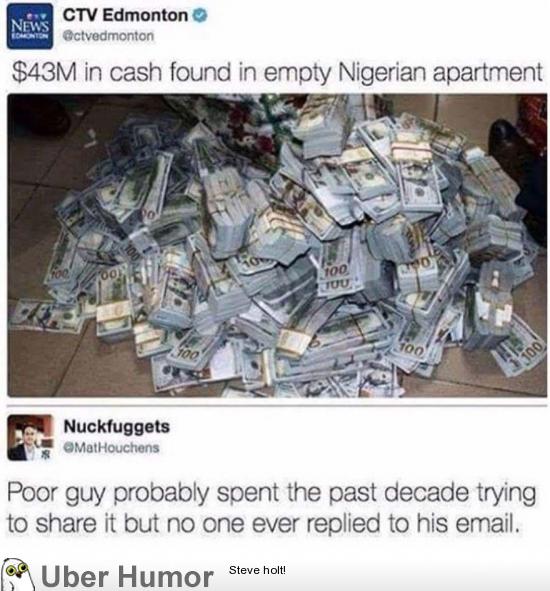Hey there, internet explorers! If you've spent any time online, chances are you've come across the legendary Nigeria Prince Meme. It's one of those internet phenomena that has stuck around for years, evolving with the times while staying hilariously relevant. But have you ever wondered where this meme originated and why it's still so popular? Let's dive into the world of Nigerian princes, email scams, and the humor that keeps this meme alive.
Picture this: You're scrolling through your emails, and suddenly, BAM! There it is—an email from a "Nigerian prince" claiming they need your help to transfer millions of dollars. All you have to do is provide your bank details, and voilà, instant riches, right? Wrong! This classic scam has been around for decades, but its transformation into a meme masterpiece is what makes it unforgettable. The Nigeria Prince Meme is more than just a joke—it's a cultural phenomenon.
So, why does this particular meme resonate so deeply with people? Well, it's not just about the hilarity of fake royalty asking for money. It's about the absurdity of it all, the exaggerated language, and the sheer audacity of these scammers. In this article, we'll explore the origins of the Nigeria Prince Meme, its evolution over the years, and why it continues to entertain millions worldwide.
Read also:Undress App The Ultimate Guide To Privacy Features And Why Everyones Talking About It
Before we dive deeper, here's a quick table of contents to guide you through this wild ride:
- Origins of the Nigeria Prince Meme
- How the Meme Evolved Over Time
- The Language of Scammers
- Cultural Impact and Popularity
- Classic Examples of the Nigeria Prince Meme
- Modern-Day Versions of the Meme
- Real Scams vs. Memes
- Nigeria Prince Meme in Art and Media
- Lessons We Can Learn
- Wrapping It All Up
Origins of the Nigeria Prince Meme
Alright, let's rewind the clock and explore how this meme came to be. The Nigeria Prince Meme is rooted in one of the oldest online scams known as the "Nigerian 419 scam." Named after Section 419 of the Nigerian Criminal Code, this scam involves sending fraudulent emails to unsuspecting victims, promising them large sums of money in exchange for a small upfront fee.
The Early Days of Online Scams
Back in the '80s and '90s, before the internet was as widespread as it is today, scammers would send letters instead of emails. These letters would often claim that the sender was a deposed prince or government official in need of assistance to move large sums of money out of the country. As the internet became more accessible, these scams transitioned to email, reaching a much broader audience.
Now, here's the kicker: despite how obvious these scams are today, they were actually pretty effective back in the day. People fell for them because they were new to the internet and didn't know any better. It wasn't until the internet community started mocking these scams that they became the stuff of legends.
How the Meme Evolved Over Time
Fast forward to the early 2000s, and the Nigeria Prince Meme began to take shape. At first, it was just a simple joke about how ridiculous these emails were. But as the internet grew, so did the creativity behind the meme. People started adding their own twists, creating entire narratives around these fictional princes.
Read also:P2p Iot The Future Of Device Networking Is Here
From Emails to Memes
One of the most iconic versions of the Nigeria Prince Meme features a prince named "Prince Nnamdi," who became a recurring character in internet culture. This character was often depicted as a bumbling yet charming scammer, complete with exaggerated accents and over-the-top language. It was this playful take on the scam that made it so endearing to the online community.
As time went on, the meme evolved even further. People began incorporating it into other forms of media, such as videos, animations, and even music. The Nigeria Prince Meme became a versatile tool for creators to express their humor and creativity.
The Language of Scammers
Let's talk about the language used in these emails. If you've ever seen one, you'll notice a distinct pattern. The grammar is often broken, the sentences are overly formal, and the tone is desperate yet oddly polite. This unique style of writing has become a hallmark of the Nigeria Prince Meme.
Why Do Scammers Write This Way?
Interestingly, the broken English and exaggerated language are not just mistakes. They're actually a deliberate tactic used by scammers to filter out skeptical individuals. By making the email sound so ridiculous, scammers can quickly identify those who are gullible enough to respond. It's a genius move, albeit a morally questionable one.
This linguistic quirk has inspired countless parodies, with people mimicking the style in everything from tweets to blog posts. It's this playful imitation that keeps the meme alive and well in the digital age.
Cultural Impact and Popularity
It's hard to overstate just how influential the Nigeria Prince Meme has become. It's not just a joke anymore; it's a cultural touchstone that has permeated various aspects of modern life. From TV shows to movies, the meme has made appearances in mainstream media, cementing its place in pop culture history.
Why Do People Love This Meme?
There are a few reasons why the Nigeria Prince Meme resonates so strongly with people. For one, it's a perfect example of taking something negative—fraud—and turning it into something positive—laughter. It's also a reminder of how far we've come in terms of internet literacy. Back in the day, these scams were a real threat, but now they're just a source of entertainment.
Moreover, the meme serves as a commentary on the absurdity of human nature. It highlights our willingness to believe in things that seem too good to be true, even when the evidence is staring us in the face. It's a lesson in skepticism wrapped up in a hilariously bad email.
Classic Examples of the Nigeria Prince Meme
Let's take a look at some of the most iconic examples of the Nigeria Prince Meme. These examples showcase the creativity and humor that have made the meme so beloved.
Famous Prince Nnamdi Parodies
- "Dear Sir/Madam, I am Prince Nnamdi of Nigeria. I have inherited $25 million and need your help to transfer it. Please provide your bank details."
- "As the rightful heir to the throne, I require your assistance in securing a safe haven for my vast fortune. Together, we can make dreams come true!"
- "Greetings from Nigeria! I am a prince in exile, and I need your cooperation to retrieve my family's wealth. Trust me, this is a once-in-a-lifetime opportunity!"
These examples highlight the absurdity of the emails while maintaining the charm that has made them so memorable.
Modern-Day Versions of the Meme
As the internet continues to evolve, so does the Nigeria Prince Meme. Today, you'll find countless variations that incorporate modern technology and trends. From TikTok videos to Twitter threads, creators are constantly finding new ways to keep the meme fresh and relevant.
How Technology Has Changed the Meme
One of the most interesting developments is the use of AI-generated content to create realistic-looking scam emails. These emails are so convincing that even seasoned internet users might pause for a moment before realizing they're fake. It's a testament to how far technology has come and how adaptable the meme remains.
Additionally, the meme has been used to raise awareness about online security. By highlighting the dangers of phishing scams and identity theft, creators are using humor as a tool to educate the public.
Real Scams vs. Memes
While the Nigeria Prince Meme is all fun and games, it's important to remember that the underlying scams are very real. People still fall victim to these schemes every year, losing thousands of dollars in the process. As entertaining as the meme may be, it's crucial to stay vigilant and educate others about the dangers of online fraud.
How to Protect Yourself
- Never provide personal or financial information to someone you don't know.
- Be skeptical of unsolicited emails promising large sums of money.
- Verify the authenticity of any requests for help, especially if they involve transferring funds.
By following these simple guidelines, you can protect yourself and others from falling prey to these scams.
Nigeria Prince Meme in Art and Media
Artists and creators have embraced the Nigeria Prince Meme as a source of inspiration. From paintings to sculptures, the meme has been reimagined in countless forms. It's a testament to its enduring appeal and the impact it has had on the creative community.
Pop Culture References
Several TV shows and movies have referenced the Nigeria Prince Meme, using it as a plot device or a comedic element. For example, the popular Netflix series "BoJack Horseman" featured an episode where a character falls for a Nigerian prince scam, leading to hilarious consequences. These references help keep the meme alive and introduce it to new audiences.
Lessons We Can Learn
At its core, the Nigeria Prince Meme teaches us valuable lessons about skepticism, creativity, and the power of humor. It reminds us to question what we see online and to approach everything with a healthy dose of caution. It also shows us that even the most absurd situations can be turned into something positive.
Key Takeaways
- Be skeptical of unsolicited offers, no matter how tempting they may seem.
- Use humor to tackle serious issues and make them more approachable.
- Stay informed about online scams and share your knowledge with others.
By applying these lessons to our daily lives, we can navigate the digital world with confidence and a sense of humor.
Wrapping It All Up
And there you have it, folks! The Nigeria Prince Meme is more than just a joke; it's a cultural phenomenon that has captured the hearts and minds of internet users worldwide. From its humble beginnings as a simple email scam to its current status as a meme masterpiece, this phenomenon has come a long way.
As we've explored in this article, the meme's origins, evolution, and cultural impact make it a fascinating subject to study. It's a reminder of how far we've come in terms of internet literacy and how humor can bring people together. So, the next time you come across a Nigeria Prince Meme, take a moment to appreciate its rich history and the lessons it offers.
Now, it's your turn! Share this article with your friends, leave a comment, or check out some of our other content. Together, let's keep the spirit of the Nigeria Prince Meme alive and thriving for years to come. After all, who doesn't love a good prince in exile story?


